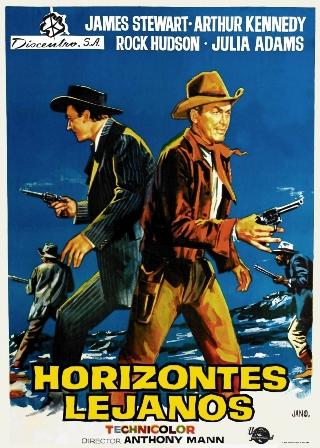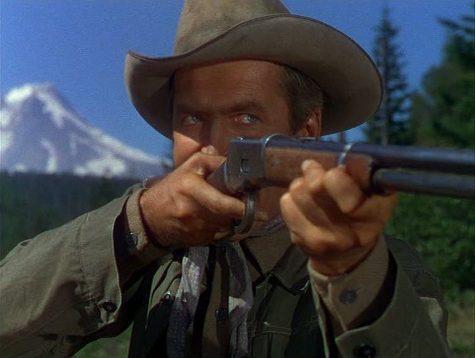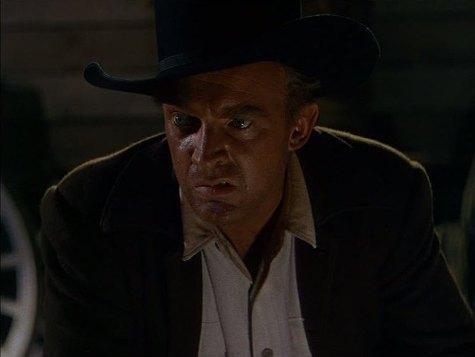
You’ll be seeing me. You’ll be seeing me. Every time you bed down for the night, you’ll look back to the darkness and wonder if I’m there. And some night, I will be. You’ll be seeing me.
If you watch enough westerns, from almost any era, it soon becomes apparent that certain themes and subtexts crop up time and again. The one that I feel is the most constant, that seems to almost define the genre as a whole, is the concept of change. It literally pervades the genre: changes to the landscape, control of the country, the law, social organization, transport, the notion of freedom and opportunity, and so on. Of course some of these aspects either increased or decreased in popularity in relation to the time at which they were produced. So it’s no accident that the 50s, with that decade’s frequent meditations on the idea of personal redemption, should see a tendency to focus on changes in the hearts of men. Bend of the River (1952) concerns itself with atonement for the sins of the past and the desire to change the course of one’s life, along with the associated obstacles and prejudices that need to be overcome.
The Civil War has ended and the westward push is on, the drive to roll back the frontier and build something new and fresh. Over the opening credits a wagon train makes its way through the unspoiled beauty of Oregon. The settlers, headed up by Jeremy Baile (Jay C Flippen), are full of hope and a determined pioneering spirit. There’s a kind of wholesome enthusiasm that radiates from these people, and it’s reflected too in the man who’s guiding them, Glyn McLyntock (James Stewart). When he rides ahead to scout the trail we get the first indication that McLyntock isn’t unsullied characters his traveling companions believe. Topping a rise, he stumbles upon a nasty little scene in the clearing below. There’s a lynching in progress for a horse thief. Seeing as a man’s horse was often his most valuable possession and could mean the difference between survival and death in a hostile environment, frontier justice dictated that the rope was all one could expect for such a heinous crime. Still and all, lynching is a dirty little business, and it’s no surprise that McLyntock intervenes and saves the life of the condemned man. No, that in itself is entirely understandable – what is telling though is the reaction of McLyntock just before he draws his gun. His features register violent revulsion but there’s something of the hunted man that flashes briefly from his eyes. It transpires that the man at the end of the rope is Emerson Cole (Arthur Kennedy), a former border raider whose name is familiar to McLyntock. It’s soon revealed that Cole has also heard of McLyntock, both of them having been in the same line of business so to speak. While these two men with a dark past may have some things in common, there is one crucial difference. The devil-may-care Cole has no regrets about his actions whereas McLyntock is a deeply troubled figure, a man trying to bury his unsavory deeds and make a new beginning among people who trust him. When the wagon train rolls into Portland Cole and McLyntock bid each other farewell – Cole thinking only of how best to make his fortune while McLyntock is bound for the clean air and anonymity of the high country. However, these two are destined to cross paths again. The settlers need supplies shipped to them to see them through their first winter and have paid for delivery in advance. As is often the case though, circumstances change dramatically when greed rears its ugly head. A trip back to Portland sees McLyntock and Cole renewing their acquaintance. But theirs is an uneasy relationship, their friendship balanced rather precariously at all times. The shadows of the past are never far away, beckoning enticingly to Cole while pointing accusingly at McLyntock. On the run from new enemies in Portland, it remains to be seen how fast the friendship of these men will be, and whether McLyntock will be allowed to prove to his companions and himself that a man can truly change his ways.

Bend of the River was Anthony Mann’s second western with James Stewart, continuing what was to become a highly influential cycle of movies and further developing the persona of the tortured lead. One of the key visual motifs in Mann’s work the continual striving upwards of his characters, the drive to rise above base instincts and cares. Although this feature isn’t quite as pronounced in Bend of the River as it is in some of his other movies, it is still there. The wagon train, and most especially McLyntock, view as the mountain country as a kind of promised land where social and spiritual rebirth are possible. Irving Glassberg photographed the stunning Oregon locations beautifully, and the contrast between the crisp freshness and purity of the mountains is contrasted strongly with the darker, more restrictive and corrupt feeling of the town gripped by gold fever. The central theme of a man desperate for change and redemption is well handled by Man, working from a Borden Chase script. Additionally, there’s a fairly complex notion of duality at work too. In essence, Cole and McLyntock are mirror images. The inevitable confrontation represents McLyntock squaring off against his own darker nature as much as anything else.

I think it’s impossible to overemphasize how instrumental Mann was in shaping James Stewart into one of the major post-war movie stars, although both Hitchcock and Capra had a hand in the process too. For much of the time Stewart is, superficially at least, in amiable mode, yet there’s always an unease there. This of course is entirely appropriate as his character is burdened by a tremendous sense of guilt and also a sort of slow burning dread that his past will be revealed and lead to his being rejected. As usual Mann managed to get Stewart to dig deep within himself and draw on his reserves. There are three notable occasions where Stewart’s consuming rage threaten to overcome him. The first is the momentary rush of emotion at the sight of the lynching. The next occurs when the rebellious laborers hired in Portland drop the full weight of a jacked up wagon on Baile – the startling intensity of Stewart’s fury rendering him speechless and inarticulate. However, it’s the final outpouring that carries the greatest impact. With the mutiny complete and Cole having shown his true colors, the emotionally distraught Stewart delivers those lines which I featured at the top of the article. Written down in black and white, they lack the power with which Stewart invests them in his cold, calculated and measured way. With his voice threatening to crack under the strain of maintaining self-control, no-one is left in any doubt that the gloves are off, the Rubicon has been crossed and there’s no going back.
Arthur Kennedy proved a splendid foil for Stewart; where Stewart was all inner conflict and suppressed emotion, Kennedy was a man very much at ease with his own villainy. However, that’s not to say his performance was one-note or lacking in nuance. He starts off as something of a rogue, but not an entirely unattractive one. It’s his innate greed and an inability to rise above his own self-interest that sees him develop into a fully fledged villain. As such, we don’t get the same shock as would be the case a few years later when Kennedy again teamed up with Stewart and Mann to make The Man from Laramie. Here, Kennedy’s character is clearly morally corrupted from the beginning and it’s only the extent that’s in question. The supporting cast in Bend of the River is a remarkably strong one starting with Julia Adams, Rock Hudson and the great Jay C Flippen. This was one of the star making roles for the rising Hudson, a vigorous, heroic part as the young gambler who signs on with the wagon train. Hudson’s good enough at what he’s asked to do, but really it’s not very demanding stuff and he makes only a limited impression. Julia Adams’ beautiful presence graced many a movie for Universal during the 50s and I always like to see her name in the credits. This film offered her a good part as the girl who initially falls for Kennedy’s charm before finally seeing him for what he is and switching her affections to Stewart. And there’s no shortage of familiar faces to add to the villainy ranged against Stewart – Howard Petrie, Royal Dano, Jack Lambert and Harry Morgan all put in good performances. And then there’s Stepin Fetchit, an actor whose characterizations remain controversial to this day. I think it’s worth noting that both Scott Nollen (whose latest book I reviewed last week) and Joseph McBride have interesting things to say about this performer, namely the way John Ford and he tried to actually subvert racial stereotypes in their work together.
I think Bend of the River is available on DVD pretty much everywhere these days – it’s certainly been out in both the UK and the US via Universal for many years now. The UK disc I have is a completely bare bones affair with nothing at all in the way of extra features. However, the transfer of the film is very good indeed, with excellent color and no print damage worth mentioning. In the past I’ve tried broadly rating or comparing the westerns that Mann and Stewart made together, but it’s essentially a pointless exercise. These are all strong and rewarding movies that can be watched repeatedly without losing any of their power or freshness. Let’s just say that this is one of the top-tier westerns from a great team and leave it at that.
I would just like to add a brief postscript here to let anyone who’s interested in such things know that this has been the 250th film which I’ve had the pleasure of writing about on this site.
